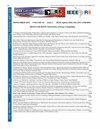Nonlinear trajectory tracking with a 6DOF AUV using an MRAFC controller
IF 1.3
4区 工程技术
Q3 COMPUTER SCIENCE, INFORMATION SYSTEMS
引用次数: 0
Abstract
New technologies such as AUVs are used for marine exploration, considered a widespread solution in ocean monitoring, whose conventional controllers such as PID or LQR present inaccuracy in the path traversal and instability when faced with disturbances. Such that, in order to achieve sufficient precision in the path traversal and to be able to measure seabed parameters, the design of a Reference Model Adaptive Fuzzy Controller (MRAFC) is proposed. Which is a control strategy based on a combination of fuzzy systems theories using the Takagy- Sugeno model and adaptive control laws, respecting Lyapunovs nonlinear control theories to generate a robust control against inherent disturbances of the environment. Thus, the results obtained when comparing the MRAFC controller versus LQR and MRAC test controllers show better performance in different scenarios. Where the first scenario is ideal conditions, whose result is similar when the AUV is close to the origin and unstable in the LQR controller when it moves away from the design convergence point. A second scenario is considered the disturbances, obtaining unstable behaviors from the moment of the disturbance in the LQR and MRAC controllers, observing overstresses in the control variable causing chattering effect. While the last scenario is dedicated to recreate an environment with noise affecting the reading of the vehicle variables where only the MRAFC control law is able to compensate and control in a hostile environment. Therefore, based on the results of this research it is possible to identify the MRAFC controller as suitable for AUV where precision and stability are necessary.使用MRAFC控制器的6DOF AUV非线性轨迹跟踪
auv等新技术被用于海洋勘探,被认为是海洋监测的一种广泛解决方案,其传统控制器如PID或LQR在面对干扰时存在路径穿越不准确和不稳定的问题。为此,为了达到足够的路径遍历精度并能够测量海底参数,提出了参考模型自适应模糊控制器的设计。它是一种基于模糊系统理论结合Takagy- Sugeno模型和自适应控制律的控制策略,尊重lyapunos非线性控制理论,产生对环境固有干扰的鲁棒控制。因此,将MRAFC控制器与LQR和MRAC测试控制器进行比较得到的结果在不同场景下表现出更好的性能。其中,第一种情况为理想条件,其结果与AUV靠近原点时的情况相似,当AUV远离设计收敛点时,在LQR控制器中不稳定。第二种情况是考虑干扰,从LQR和MRAC控制器的扰动时刻获得不稳定行为,观察到控制变量的超应力导致抖振效应。而最后一个场景是专门重建一个环境噪音影响车辆变量的读数,只有MRAFC控制法能够补偿和控制在恶劣的环境。因此,基于本研究的结果,有可能确定MRAFC控制器适用于需要精度和稳定性的水下航行器。
本文章由计算机程序翻译,如有差异,请以英文原文为准。
求助全文
约1分钟内获得全文
求助全文
来源期刊

IEEE Latin America Transactions
COMPUTER SCIENCE, INFORMATION SYSTEMS-ENGINEERING, ELECTRICAL & ELECTRONIC
CiteScore
3.50
自引率
7.70%
发文量
192
审稿时长
3-8 weeks
期刊介绍:
IEEE Latin America Transactions (IEEE LATAM) is an interdisciplinary journal focused on the dissemination of original and quality research papers / review articles in Spanish and Portuguese of emerging topics in three main areas: Computing, Electric Energy and Electronics. Some of the sub-areas of the journal are, but not limited to: Automatic control, communications, instrumentation, artificial intelligence, power and industrial electronics, fault diagnosis and detection, transportation electrification, internet of things, electrical machines, circuits and systems, biomedicine and biomedical / haptic applications, secure communications, robotics, sensors and actuators, computer networks, smart grids, among others.
 求助内容:
求助内容: 应助结果提醒方式:
应助结果提醒方式:


